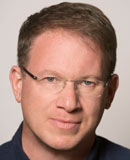November 18, 2014 — Jeffrey Goldberg, national correspondent for The Atlantic, discussed the increasing dangers of reporting on the Middle East and provided candid guidance for those who aspire to cover the region.
Journalists covering the Middle East should prepare for a high volume of criticism and threats, something that Goldberg has become accustomed to. The positive side is that “intense passion is your friend,” said Goldberg, “because at least people are reading you.”
Another challenge is the seemingly intractable nature of conflict in the Middle East. When rereading his 1997 interview with Benjamin Netanyahu, Goldberg thought the story seemed familiar. He then realized that “the things that he said to me 17 years ago for this story, are things that he said to me three months ago, the last time I interviewed him.” The situation in the region had worsened, said Goldberg – a discouraging development for someone who went into journalism to “move issues forward.”
Goldberg expressed his concerns about the increase in violence toward journalists who cover the region – a change from experiences earlier in his career. He reflected on the thrill of covering stories in Pakistan and Afghanistan in the late 1990s and early 2000s, when he would spend an evening with leaders of terrorist organizations – and get out alive, with interesting information.
Some American journalists were killed during this time, such as Daniel Pearl, but Goldberg said it was the exception. There was an unspoken transactional agreement between journalists and terrorist organizations: Journalists gained access in exchange for accurate reporting on the group’s message.
Now, “ISIS changes everything,” said Goldberg.
Five or ten years ago, Goldberg advised college graduates wanting to break into the field to “go learn Arabic and Farsi – go set yourself up in Cairo or Baghdad.” Back then, he saw it as an exciting opportunity – but no longer.
“One of the people…I said that to was Steven Sotloff,” said Goldberg.
Goldberg said “the unwritten rule has gone away,” due to “the increasing brutality of the global Sunni jihadist movement,” and because “there’s no need for the middle man anymore.”
“ISIS communicates perfectly well through YouTube and Twitter and Facebook – it doesn’t need us,” said Goldberg.
To cover dangerous regions, Goldberg advised tapping experts and people active on social media. Important humanitarian stories are going uncovered because of a lack of access, he said, such as the enslavement of thousands of Yazidi women in Iraq. “Just because you can’t get pictures doesn’t absolve you of the need to cover it,” he said.
When asked about collaborating with journalists and bloggers in conflict regions as a potential option, Goldberg said that while these relationships can be difficult to manage from thousands of miles away, it could be a “worthy idea” to pursue to gain greater access in the region.
Article by Nilagia McCoy of the Shorenstein Center.


